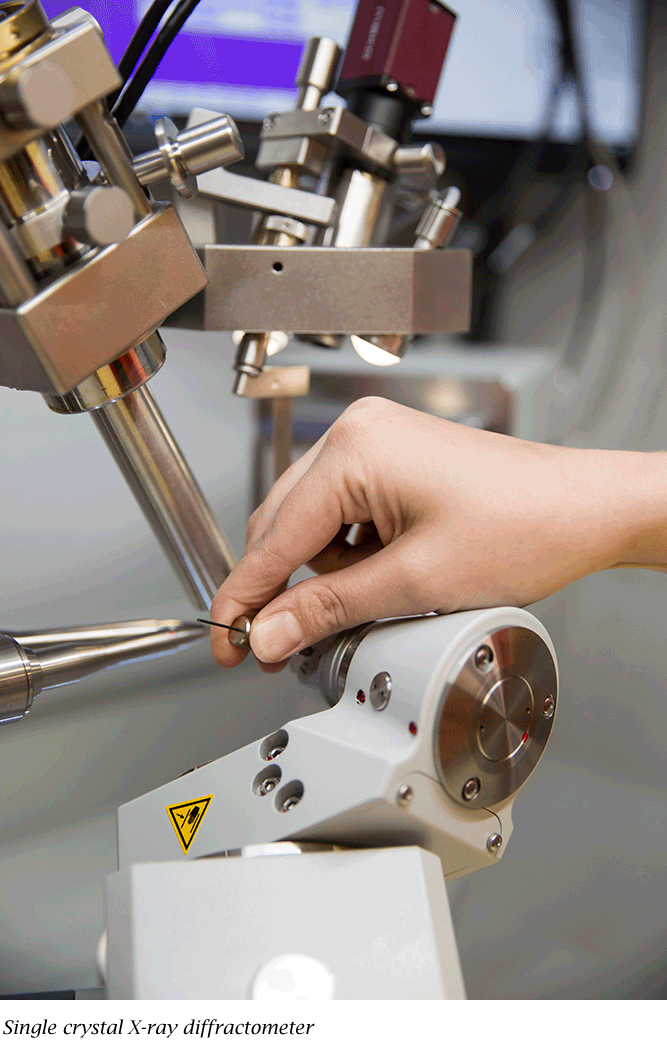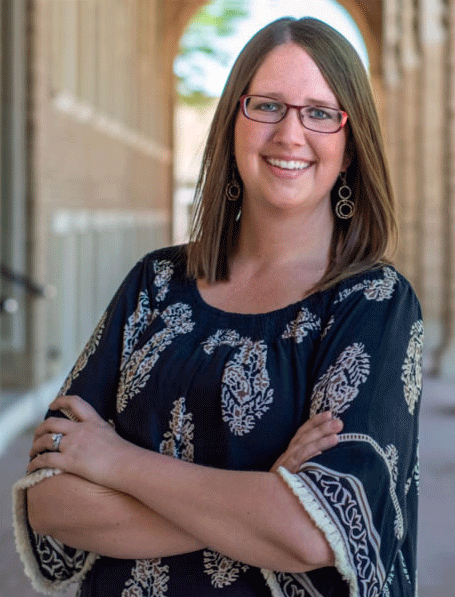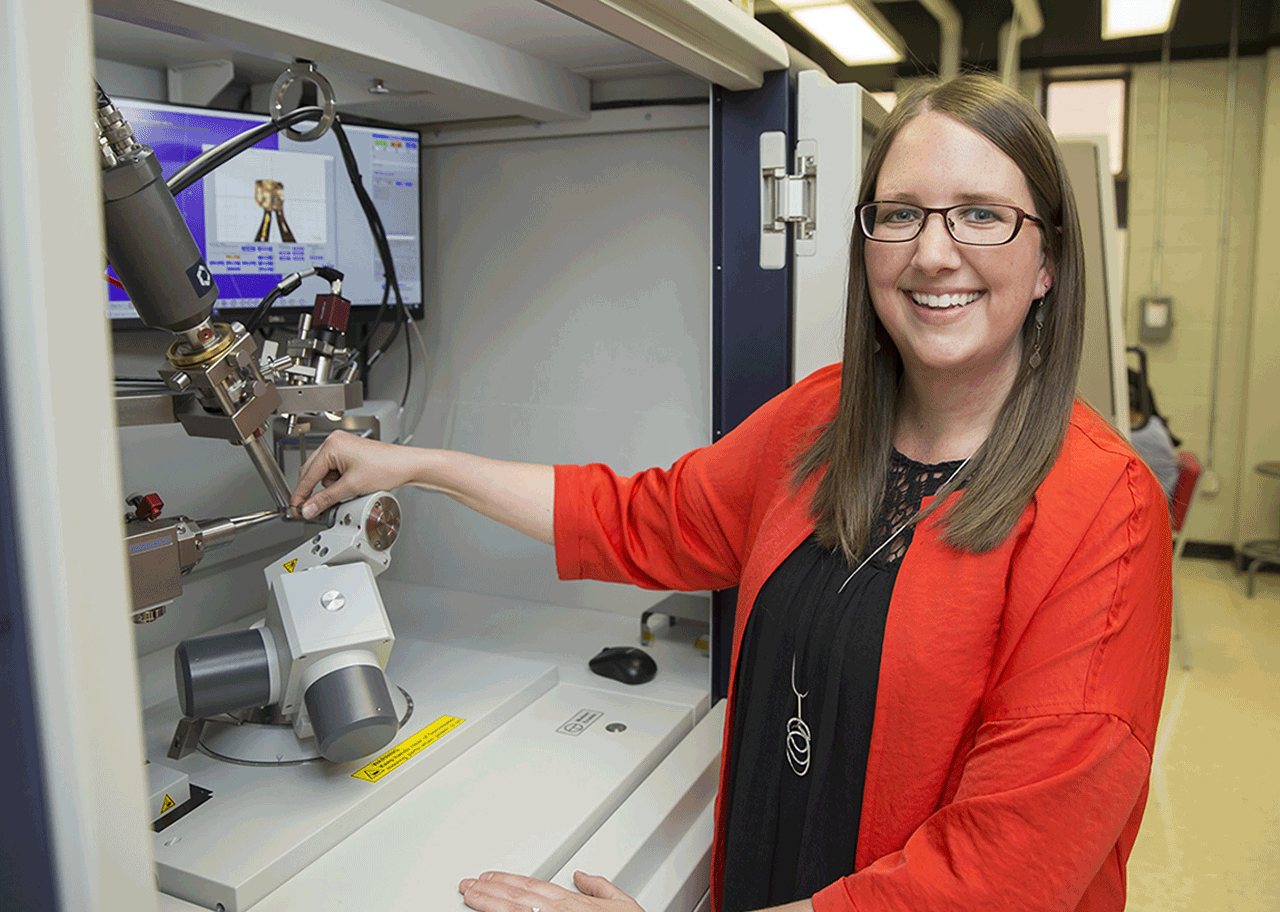Women in Research
Texas Tech University chemist Kristin Hutchins tells female students who are interested in an academic career to focus on their goals and motivations, and to seek mentors willing to cultivate and encourage their professional development.
Chemist Kristin Hutchins
During March, Texas Tech celebrates women faculty who exemplify excellence in research, scholarship, creative activity, teaching, and mentoring.
3.6.2020
Kristin Hutchins is an assistant professor in the Department of Chemistry & Biochemistry. Her research, and that of her group, is inspired by the way in which nature utilizes reversible, non-covalent interactions such as hydrogen bonding and metal coordination to create large, functional structures (e.g. DNA double helix, hemoglobin). Her group focuses on designing and synthesizing new functional materials that can be used in applications ranging from water purification and environmental remediation to molecular sensors and responsive crystals.
In the question-and-answer session that follows, Hutchins describes her work more fully.
What inspired you to work in your field/area of expertise?
 I enjoyed science and math classes throughout school, so when I started my undergraduate
education, I declared a biology major with pre-med intention. However, I found that
I enjoyed my chemistry coursework more than my biology classes.
I enjoyed science and math classes throughout school, so when I started my undergraduate
education, I declared a biology major with pre-med intention. However, I found that
I enjoyed my chemistry coursework more than my biology classes.
As a junior, I decided that chemistry was a better fit for me, so I changed my major and shifted my focus toward pursuing a Ph.D. in chemistry. I reached out to faculty in the chemistry department and started doing undergraduate research. My research experience convinced me that graduate school was definitely the path for me.
I began working within the field of crystal engineering, which focuses on synthesizing solid-state materials with desired properties. The field draws much of its inspiration from natural systems such as DNA or hemoglobin, which use reversible, noncovalent interactions to generate large, functional structures. Although the building blocks and interactions can be relatively simple, the functionality and properties of the material can be quite unique and complex.
I find great enjoyment in designing a material, going to the lab and synthesizing it, and studying its properties. My group works in this area of research today, and we construct materials that exhibit desired functions through use of noncovalent interactions.
Who inspired you to pursue academia?
When I started graduate school, my ultimate career goal was still undecided. However, during my third year, I attended a Gordon Research Conference (GRC) and it helped shape my aspirations. The GRC was filled with excellent science, and I was able to interact with many leaders in my field. I had considered an academic career, and it was my experience at the GRC solidified that choice. I chose academia because I enjoyed research, writing manuscripts, and teaching.
My Ph.D. advisor (Len MacGillivray) was exceptionally supportive of my career choice, and he continuously challenged me to achieve success in research and writing.
As a postdoc, I entered a new field and challenged myself to learn a different skill set (polymer chemistry). My advisor (Jeff Moore) assembled his team to include diverse backgrounds. He was supportive and encouraging, even though I had never synthesized a polymer prior to joining his group. Jeff taught me to think about the big picture and examine problems from different angles.
Though I learned different skills working with Len and Jeff, both continue to influence my mentoring today. They were also enthusiastic about our science and passionate about teaching others, which helped inspire me to pursue academia.
What would you tell your female students interested in pursuing an academic career?
 It is essential to have mentors and family/friends who support you throughout your
academic career. During my childhood, my parents never told me I couldn't do something
because I was a girl. I think this was important because I never learned the 'this
is only for boys' mentality.
It is essential to have mentors and family/friends who support you throughout your
academic career. During my childhood, my parents never told me I couldn't do something
because I was a girl. I think this was important because I never learned the 'this
is only for boys' mentality.
It's no secret that academia remains male dominated, especially in STEM, and being a female academic comes with a unique set of challenges. However, we cannot and should not adopt a 'this is for men' mentality.
Throughout my career, it has been helpful to identify women who embody things I want to achieve. Sometimes, I seek advice from these women; other times it's helpful just to see that another woman has done this.
Find mentors who will cultivate and encourage your professional development. I still seek advice from my Ph.D. and postdoctoral mentors; they are exceptionally supportive, and I am grateful for them. My spouse is also very supportive. He has always put my career first and reminds me I can tackle anything.
For females pursuing academia, focus on your goals and what motivates you, then strive to achieve them. When you encounter inevitable challenges, seek advice and utilize your support system.
College of Arts & Sciences
-
Address
Texas Tech University, Box 41034, Lubbock, TX 79409-1034 -
Phone
806.742.3831 -
Email
arts-and-sciences@ttu.edu

